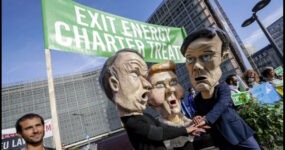EU countries, including Germany, have spent billions to help citizens get through the energy crisis, though measures have not been targeted towards society’s most vulnerable, the European Commission said on Tuesday (22 November).
Aid packages worth billions were launched by EU governments to fend off the energy crisis, despite criticism related to their scale. Germany, for one, went as far as to announce a relief package worth up to €200 billion.
However, two-thirds of government measures aimed at helping households and businesses did not target society’s most vulnerable, a report on the budgetary situation of the eurozone the Commission presented in Strasbourg on Tuesday (22 November) reads.
Instead, they were used to subsidise prices for consumers more generally, something the EU executive says could reduce incentives to save energy and further fuel inflation.
The non-targeted measures add up to an order of magnitude of 0.9% of the total economic output of the eurozone, the report says. Targeted measures, on the other hand, would only amount to 0.4% of the GDP of eurozone countries.
The report also examines how the admission of refugees from Ukraine affects the budgetary situation of the member states. The costs for this amount to 0.1% of economic output.
Germany also under fire
The Commission also took aim at Germany, the bloc’s largest member state.
When initially announced, Germany’s €200 billion aid package came under fire, with critics saying it would put other EU countries at a competitive disadvantage because they would not be able to help businesses on a similar scale.
In its new report, the Commission looked at the macroeconomic consequences. It urged euro area countries not to boost spending without creating new means of financing, like raising taxes, as this could further increase the pressure on prices. EU finance ministers, too, endorsed this recommendation, Economy Commissioner Paolo Gentiloni stressed at the report’s presentation on Tuesday.
Yet, according to the report, fiscal expansion is clearly happening in Germany.
“We invite Germany like other countries where we see this high expenditure growth to take necessary measures within the national budgetary process to ensure that the 2023 budget is consistent with the Council recommendation,” Commission Vice-President Valdis Dombrovskis said at a press conference in Strasbourg.
Other measures proposed by Gentiloni during the report’s presentation include the continuation of important government investments, such as in energy infrastructure, as well as targeted aid for households at risk of poverty. Business aid should also be “temporary and targeted”, he stressed.
The Commission also noted the need for rising wages.
“Wage developments should protect purchasing power, in particular for low wage earners, while reflecting medium-term productivity developments and limiting second-round effects on inflation,” Gentiloni said. Second-round effects are what economists call the pass-through of increased wage costs to consumers, which can cause another round of price increases.
Tax increases as a means to finance increased spending?
In its annual report, the German Council of Economic Experts, which advises the government on economic policy, pointed to the measures announced or already implemented to combat the energy crisis clearly exceeding those of other EU countries.
Germany spends more than 7% of its annual economic output on transfer payments, tax cuts and support measures for companies related to the energy crisis. This puts the country, together with Malta, in a leading position compared to other EU countries, the report also said.
In the same report, the Council of Economic Experts also suggests increasing taxes as a temporary counter-financing measure, though liberal Finance Minister Christian Lindner has rejected the idea.
Tax increases could possibly only make a small contribution, “and that would be dangerous”, Lindner told public broadcaster ARD on Tuesday morning.
“We have a recession, so we have slowing economic performance, we have enormous investment needs in the next few years, in clean technologies for example, and great economic uncertainties.”
In this situation, tax increases would be a major economic risk and “end up being at the expense of jobs and investments”, Lindner added.
Source: Euractiv.com















Leave a comment